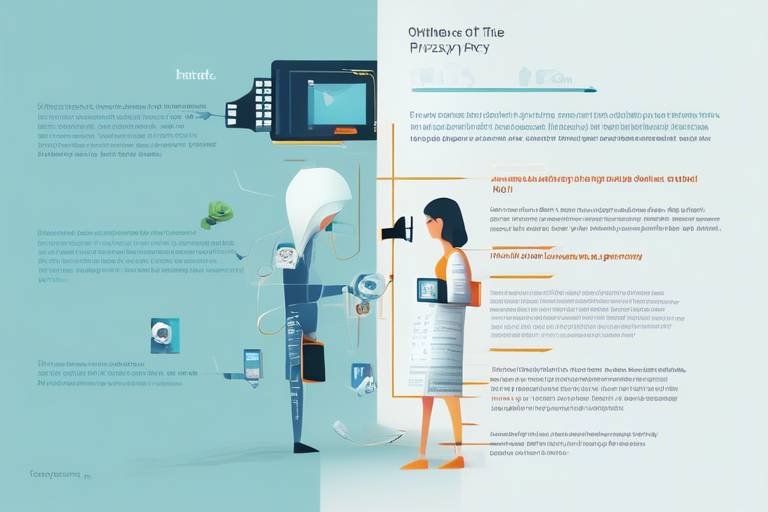The Future of Online Privacy - Challenges Ahead
In today's hyper-connected world, where every click and swipe leaves a digital footprint, the concept of online privacy has never been more critical. With the rapid evolution of technology, users find themselves at a crossroads, grappling with the implications of sharing personal information in exchange for convenience. The digital landscape is expanding, and while it offers countless opportunities, it also presents significant challenges in safeguarding our most sensitive data. So, what does the future hold for online privacy? Are we prepared to face the mounting challenges that come with it?
As technology advances, the methods of data collection have become increasingly sophisticated and pervasive. Organizations now have access to a treasure trove of personal information, from browsing habits to location data, often collected without users fully understanding the implications. This data is not just a collection of numbers and letters; it represents real people, their preferences, and their lives. Companies utilize various techniques to gather this information, including:
- Cookies: Small files stored on users' devices that track online behavior.
- Social Media Monitoring: Analyzing posts and interactions to glean insights into user preferences.
- Mobile Tracking: Using GPS and other location services to monitor user movements.
Each of these methods raises significant concerns about user privacy. Are users truly aware of what they are giving up? The challenge lies in finding a balance between personalized experiences and maintaining privacy.
In response to growing concerns over privacy, new regulations are emerging to protect users. Governments worldwide are recognizing the need for robust privacy laws, leading to significant legislative changes that impact both businesses and consumers. For instance, the introduction of the General Data Protection Regulation (GDPR) in the European Union has set a new standard for data protection. But what does this mean for organizations? Compliance can be a daunting task, requiring changes in how they handle user data.
The GDPR has not only revolutionized data protection in Europe but has also influenced privacy laws across the globe. Countries are now looking to adopt similar frameworks, which can lead to a more unified approach to online privacy. This regulation emphasizes the importance of user consent, transparency, and the right to be forgotten. However, the implementation of such laws often varies significantly between regions, leading to a patchwork of compliance challenges for multinational companies.
Implementing the GDPR is no walk in the park. Organizations face several hurdles, including:
- Understanding Compliance Requirements: Many businesses struggle to grasp the full extent of what compliance entails.
- Resource Allocation: Smaller companies may lack the necessary resources to implement robust data protection measures.
- Ongoing Training: Ensuring that employees are educated about privacy practices can be an ongoing challenge.
These challenges can be overwhelming, but they are essential for fostering a culture of privacy within organizations.
Despite these challenges, the benefits of GDPR compliance are significant. Organizations that prioritize user privacy can enjoy:
- Increased Trust: Users are more likely to engage with brands that demonstrate a commitment to protecting their data.
- Reduced Risk of Penalties: Non-compliance can lead to hefty fines, making adherence financially beneficial.
- Competitive Advantage: Companies that lead in privacy practices can differentiate themselves in a crowded marketplace.
Ultimately, compliance is not just about avoiding penalties; it's about building a sustainable relationship with users based on trust.
As concerns about online privacy grow, innovative technologies are being developed to enhance user protection. From encryption tools to decentralized data storage, these solutions are designed to give users more control over their personal information. For instance, blockchain technology is being explored as a way to secure data transactions, ensuring that users maintain ownership of their information. The future of online privacy could very well depend on the adoption of such technologies, allowing users to navigate the digital world with greater confidence.
Raising awareness about online privacy is crucial in today’s digital age. Users must understand the risks associated with sharing personal information and the steps they can take to protect themselves. Education plays a pivotal role in this process, empowering individuals to make informed decisions about their online presence. Social media platforms, in particular, have a significant responsibility in promoting privacy awareness.
Social media platforms are double-edged swords. While they provide a space for connection and sharing, they also serve as a breeding ground for privacy concerns. These platforms can influence user understanding of privacy issues, often leading to a false sense of security. It’s essential for users to critically evaluate the information they share and the privacy settings they employ. Are we doing enough to educate ourselves and others about the implications of our digital footprints?
As public concern about online privacy continues to escalate, advocacy efforts are gaining momentum. Organizations and individuals alike are pushing for stronger privacy protections and greater accountability from tech companies. The future of privacy advocacy may include:
- Increased Lobbying for Stronger Laws: Advocates will likely continue to push for comprehensive privacy legislation.
- Collaborations Between Tech and Privacy Experts: Partnerships may form to develop better privacy solutions.
- Grassroots Movements: Individuals will rally together to demand transparency and accountability.
The landscape of online privacy is shifting, and with it comes the potential for significant change. The question remains: will we rise to the challenge?
Q: What is online privacy?
A: Online privacy refers to the ability to control what personal information is shared on the internet and who has access to it.
Q: Why is online privacy important?
A: Protecting your online privacy helps prevent identity theft, data breaches, and unauthorized use of your personal information.
Q: How can I protect my online privacy?
A: You can protect your online privacy by using strong passwords, enabling two-factor authentication, being cautious about sharing personal information, and utilizing privacy-focused tools.

The Rise of Data Collection
In today's digital age, the rise of data collection has become a defining characteristic of our online experiences. Every click, every scroll, and every interaction is meticulously tracked by organizations eager to gather as much information as possible about their users. This isn't just a trend; it's a fundamental shift in how businesses operate. Companies now have access to vast amounts of personal data, which they use to tailor their services, target advertisements, and ultimately increase their bottom line. But at what cost? As we dive deeper into this topic, it’s essential to understand the implications of such pervasive data collection on our privacy.
Organizations employ a variety of methods to collect data, ranging from cookies and tracking pixels to more advanced techniques like machine learning algorithms that analyze user behavior in real-time. For instance, when you visit a website, cookies can record your preferences, login information, and even your browsing history. This data is then aggregated and analyzed to create a comprehensive profile of your interests and habits. While this may enhance user experience by providing personalized content, it also raises significant privacy concerns.
Moreover, the types of data collected are becoming increasingly sophisticated. It's not just about your name and email address anymore; organizations are now collecting biometric data, location information, and even your social media activity. This data is often shared with third-party companies, creating a complex web of information that can be exploited if not properly managed. The question arises: how much of our personal information are we willing to sacrifice for convenience?
To illustrate the scale of data collection, consider the following table that highlights some common data points collected by various online platforms:
| Platform | Data Collected |
|---|---|
| Social Media | Profile information, friend connections, likes, shares, and location data. |
| E-commerce | Purchase history, browsing behavior, payment information, and shipping addresses. |
| Search Engines | Search queries, click-through rates, location data, and device information. |
| Mobile Apps | Usage patterns, in-app purchases, location tracking, and user preferences. |
This table highlights just a fraction of the data being collected daily. Additionally, the implications of such extensive data collection are profound. Users often feel a loss of control over their personal information, leading to a growing sense of distrust towards organizations that handle their data. The reality is that while data collection can enhance service delivery, it poses significant risks to privacy and security.
As we continue to embrace technology, it becomes increasingly important to strike a balance between the benefits of data collection and the right to privacy. Users must be educated about the data being collected and how it is used, while organizations need to adopt transparent practices that prioritize user consent and data protection. Ultimately, the future of online privacy hinges on our ability to navigate this complex landscape of data collection responsibly.

Regulatory Changes and Compliance
In today's fast-paced digital landscape, regulatory changes play a pivotal role in shaping the way organizations handle user data. As concerns about online privacy escalate, governments and regulatory bodies worldwide are stepping up to enforce stricter guidelines aimed at protecting personal information. These changes are not just legal formalities; they reflect a growing recognition of the need for transparency and accountability in data handling practices. For consumers, this means a greater assurance that their personal information is being treated with the utmost care and respect.
One of the most significant developments in this arena has been the introduction of comprehensive data protection laws. These laws require organizations to adopt stringent measures to safeguard user data, ensuring that individuals have greater control over their personal information. But what does this mean for businesses? Compliance with these regulations can be both a challenge and an opportunity. While it may involve significant changes to existing processes, it also offers a chance to build trust with customers by demonstrating a commitment to privacy.
To navigate the complexities of regulatory compliance, organizations must stay informed about new laws and their implications. Failure to comply can result in hefty fines and damage to a company's reputation. For instance, the General Data Protection Regulation (GDPR) in the European Union has set a high standard for data protection, influencing similar regulations globally. Companies must not only understand the legal requirements but also implement robust data protection strategies to mitigate risks.
Below is a brief overview of key regulations that have emerged recently:
| Regulation | Region | Key Features |
|---|---|---|
| GDPR | European Union | Data subject rights, consent requirements, hefty fines for non-compliance |
| CCPA | California, USA | Consumer rights to access and delete personal information, opt-out provisions |
| PDPA | Singapore | Consent-based data collection, data protection obligations for organizations |
As we look to the future, it is clear that regulatory changes will continue to evolve. Organizations must be proactive in adapting to these changes, investing in compliance programs, and fostering a culture of privacy. This not only helps avoid penalties but also enhances customer loyalty and brand reputation. In an era where consumers are increasingly concerned about their online safety, being a privacy-conscious organization can set a business apart from its competitors.
Ultimately, the landscape of online privacy is shifting rapidly, and staying ahead of regulatory changes is crucial for any organization that values its customers and its reputation. By embracing these changes and prioritizing compliance, companies can navigate the complexities of the digital world while ensuring that user privacy remains a top priority.
- What is GDPR? - The General Data Protection Regulation is a comprehensive data protection law in the EU that provides individuals with greater control over their personal data.
- How can organizations ensure compliance? - Organizations can ensure compliance by staying informed about regulations, implementing robust data protection policies, and conducting regular audits.
- What are the consequences of non-compliance? - Non-compliance can result in significant fines, legal repercussions, and damage to an organization's reputation.

GDPR and Its Global Influence
The General Data Protection Regulation, commonly known as GDPR, has revolutionized the way organizations handle personal data across the globe. Introduced in May 2018 by the European Union, this regulation not only aims to protect the privacy of EU citizens but also sets a high standard for data protection that influences legislation worldwide. But what exactly does this mean for businesses and consumers beyond Europe?
One of the most significant aspects of GDPR is its extraterritorial reach. This means that any company, regardless of its location, must comply with GDPR if it processes the personal data of individuals within the EU. Imagine a small tech startup in Brazil collecting data from users in France; under GDPR, they are bound by the same rules as a company based in Paris. This has led to a ripple effect, prompting countries around the world to reevaluate and strengthen their own privacy laws to align with GDPR standards.
As a result, we have seen a wave of new privacy regulations emerging globally, inspired by GDPR. Countries like Canada, Japan, and even states in the United States are crafting their own legislation that echoes the principles of GDPR. For instance, California's Consumer Privacy Act (CCPA) shares similarities with GDPR, emphasizing consumer rights to access and control their personal information. This trend signifies a growing recognition of the importance of data privacy in our digital age.
However, the influence of GDPR extends beyond just regulatory frameworks; it has also fostered a cultural shift in how businesses approach data privacy. Companies are now prioritizing transparency and accountability in their data practices. They are beginning to understand that protecting consumer data is not just a legal obligation but also a vital component of building trust with their customers. This shift is evident in the way organizations communicate their privacy policies, often making them clearer and more accessible to users.
To illustrate this global influence, consider the following table that highlights how GDPR has inspired similar regulations across various countries:
| Country/Region | Regulation | Key Features |
|---|---|---|
| European Union | GDPR | Right to access, right to be forgotten, data portability |
| California, USA | CCPA | Consumer rights to access, delete, and opt-out of data selling |
| Canada | PIPEDA | Consent requirements, access rights, accountability |
| Japan | APPI | Right to access, data breach notifications, stricter consent |
As we move forward, the influence of GDPR will likely continue to grow, shaping the future of privacy regulations worldwide. Organizations that embrace these changes and prioritize user privacy will not only comply with the law but also gain a competitive advantage in an increasingly privacy-conscious market. In this context, GDPR serves as a beacon, guiding both businesses and consumers toward a more secure digital landscape.
In conclusion, GDPR has not only set a precedent for data protection within Europe but has also sparked a global movement towards stronger privacy regulations. As more countries adopt similar laws, we can expect a future where online privacy is a fundamental right, and organizations are held accountable for the protection of personal data.
- What is GDPR? GDPR stands for General Data Protection Regulation, a comprehensive data protection law in the EU that governs how personal data is processed and stored.
- Who does GDPR apply to? GDPR applies to any organization that processes the personal data of individuals residing in the EU, regardless of where the organization is based.
- What are the penalties for non-compliance? Organizations can face hefty fines of up to €20 million or 4% of their annual global turnover, whichever is higher.
- How has GDPR influenced other countries? Many countries have adopted or are in the process of adopting regulations inspired by GDPR, emphasizing consumer rights and data protection.

Challenges of Implementation
Implementing the General Data Protection Regulation (GDPR) is no walk in the park for organizations, and the hurdles they face can feel like climbing a mountain without the right gear. One of the primary challenges is the sheer complexity of the regulation itself. GDPR is packed with legal jargon and requirements that can leave even the most seasoned professionals scratching their heads. Companies must not only understand the regulation but also integrate it into their existing processes, which can be a daunting task.
Another significant challenge is the need for substantial investment in technology and training. Organizations often find themselves needing to upgrade their data management systems to ensure compliance. This could involve implementing new software solutions, hiring privacy experts, or even conducting extensive staff training. The financial burden can be overwhelming, especially for small and medium-sized enterprises (SMEs) that may not have the resources to easily adapt.
Additionally, there’s the issue of data mapping. Companies must have a clear understanding of what personal data they hold, where it comes from, and how it’s processed. This requires meticulous documentation and can be a massive undertaking. Without proper data mapping, organizations risk non-compliance, which could result in hefty fines. According to recent statistics, fines for GDPR violations can reach up to €20 million or 4% of a company’s annual global turnover, whichever is higher. That's a hefty price to pay for missteps!
Moreover, the challenge of maintaining ongoing compliance cannot be overlooked. GDPR is not a one-time checklist to tick off; it requires continuous monitoring and updates to processes as regulations evolve and as new threats emerge. Organizations must establish a culture of privacy that permeates every level of their operation. This means that everyone, from the top executive to the newest hire, needs to understand their role in protecting personal data.
Lastly, there’s the challenge of balancing user privacy with business needs. Companies often struggle to find the sweet spot between collecting data for marketing and customer service purposes while respecting user privacy. This balancing act can lead to tension within organizations, especially when financial goals are at stake. To navigate this tricky terrain, businesses may need to rethink their data strategies and focus on transparency, ensuring users are informed about how their data is being used.
In summary, the challenges of implementing GDPR are multifaceted and can be overwhelming for many organizations. From understanding the legal complexities to investing in technology and maintaining ongoing compliance, the road ahead is fraught with obstacles. However, overcoming these challenges is not just about avoiding fines; it's about building trust with users and fostering a culture of privacy that can ultimately lead to long-term success.
- What is GDPR?
GDPR stands for the General Data Protection Regulation, a comprehensive data protection law in the EU that governs how personal data is collected, stored, and processed. - What are the penalties for non-compliance?
Organizations can face fines of up to €20 million or 4% of their annual global turnover, whichever is higher, for failing to comply with GDPR. - How can organizations ensure compliance?
Organizations can ensure compliance by conducting thorough data audits, investing in privacy training, and implementing robust data management systems. - Is GDPR applicable outside the EU?
Yes, GDPR applies to any organization that processes the personal data of EU residents, regardless of where the organization is located.

Benefits of Compliance
Complying with regulations like the GDPR is not just about avoiding hefty fines; it can significantly enhance an organization's reputation and operational efficiency. When businesses prioritize user privacy, they send a clear message to their customers: "We care about your data." This commitment can foster stronger customer loyalty and trust, which are invaluable in today’s competitive market. Imagine walking into a store where the staff knows your preferences and respects your choices—that’s the kind of relationship businesses can build with their customers when they prioritize compliance.
Furthermore, compliance can lead to improved data management practices. Organizations must assess their data collection and storage methods, which often results in a more streamlined approach. This can reduce unnecessary data accumulation and minimize risks associated with data breaches. It’s like cleaning out your closet; once you get rid of what you don’t need, you can find what’s important much more easily.
Additionally, compliance can open doors to new business opportunities. Many clients and partners are increasingly prioritizing privacy in their selection processes. By demonstrating a commitment to compliance, businesses can position themselves as trustworthy partners. In fact, a recent survey indicated that over 70% of consumers are willing to pay a premium for services from companies that prioritize data privacy. This is a clear indication that being compliant isn’t just a legal obligation; it’s a business advantage.
Moreover, compliance can help organizations avoid the severe financial repercussions of data breaches. The costs associated with a single data breach can be astronomical, often exceeding hundreds of thousands of dollars. By investing in compliance, organizations are effectively investing in their own financial health. It’s like buying insurance; it may seem like an expense, but it can save you from devastating losses in the long run.
In summary, the benefits of compliance extend far beyond mere adherence to regulations. They encompass enhanced customer trust, improved data management, increased business opportunities, and significant cost savings. By embracing compliance as a core value, organizations can not only protect their users but also pave the way for a more sustainable and profitable future.
- What is GDPR?
The General Data Protection Regulation (GDPR) is a comprehensive data protection law in the EU that governs how organizations handle personal data.
- Why should businesses comply with GDPR?
Compliance helps protect user data, enhances trust, and avoids significant fines associated with data breaches.
- How can compliance benefit my business?
It can improve customer loyalty, streamline data management, and create new business opportunities by demonstrating a commitment to privacy.
- What are the risks of non-compliance?
Non-compliance can lead to hefty fines, reputational damage, and loss of customer trust.

Emerging Privacy Technologies
In a world where our personal data is often treated as a commodity, the emergence of privacy technologies has become a beacon of hope for many users. These innovations are not just futuristic concepts; they are practical tools designed to give individuals more control over their personal information. Think of them as the digital equivalent of a safe deposit box, where you can store your valuables away from prying eyes. As we delve into this topic, let's explore some of the most promising technologies that are reshaping the landscape of online privacy.
One of the most exciting developments is the rise of encryption technologies. Encryption acts like a secure lock on your data, ensuring that only those with the right key can access it. With end-to-end encryption becoming increasingly common in messaging apps like WhatsApp and Signal, users can communicate without the fear of interception. This technology not only protects personal conversations but also safeguards sensitive information shared online. Imagine sending a message that only the recipient can read, while everyone else sees nothing but gibberish—this is the power of encryption.
Another noteworthy advancement is the use of blockchain technology. Originally developed for cryptocurrencies, blockchain offers a decentralized way to store data securely. This technology allows users to maintain control over their information without relying on a central authority. By using blockchain, individuals can verify their identities and share information with complete transparency. Picture a digital ledger that everyone can see but no one can alter; this is what makes blockchain a game-changer in the realm of privacy.
Moreover, the development of privacy-focused browsers and search engines is gaining traction. Tools like DuckDuckGo and Brave prioritize user privacy by not tracking searches or collecting personal data. They serve as a refreshing alternative to mainstream options that often monetize user data. By using these browsers, users can navigate the web without leaving a digital footprint, akin to walking through a crowded street without anyone knowing your destination.
Additionally, the rise of artificial intelligence (AI) in privacy technologies is noteworthy. AI can analyze vast amounts of data to identify potential threats to privacy, offering real-time protection against breaches. For instance, AI-driven tools can detect unusual patterns in data access, alerting users before any sensitive information is compromised. This proactive approach is similar to having a vigilant security guard monitoring your premises, ready to act at the first sign of trouble.
Lastly, anonymizing tools are becoming essential for users who wish to browse the internet without revealing their identity. Technologies such as VPNs (Virtual Private Networks) and Tor allow users to mask their IP addresses, making it difficult for websites to track their online activities. Using these tools is like wearing a disguise in a crowded room; you can move freely without anyone knowing who you are.
As we embrace these emerging privacy technologies, it’s crucial to stay informed and proactive. The digital landscape is constantly evolving, and understanding how these tools work can empower users to take charge of their online privacy. By leveraging these innovations, individuals can create a more secure and private online experience, ensuring that their personal information remains just that—personal.
- What are privacy technologies? Privacy technologies are tools and methods designed to protect user data and ensure personal information remains confidential.
- How does encryption work? Encryption transforms data into a coded format that can only be accessed by someone with the appropriate key, ensuring secure communication.
- What is blockchain, and how does it enhance privacy? Blockchain is a decentralized digital ledger that allows users to store data securely and transparently, giving them control over their information.
- Why should I use privacy-focused browsers? Privacy-focused browsers do not track your online activities, providing a safer browsing experience without collecting personal data.

Public Awareness and Education
In today’s hyper-connected world, the importance of regarding online privacy cannot be overstated. As individuals navigate the vast expanse of the internet, they often find themselves unwittingly sharing personal information. This is where education becomes a powerful tool. Imagine walking through a crowded marketplace, where every passerby can see your shopping list; that's how vulnerable we can feel online without the right knowledge. By raising awareness, we empower users to take control of their digital footprints and make informed decisions about their privacy.
One of the biggest challenges in achieving this awareness is the sheer volume of information available. Users are bombarded with data breaches, privacy policies, and terms of service that are often convoluted and difficult to understand. As a result, many people simply click “accept” without reading the fine print. This is akin to signing a contract without knowing what it entails. Therefore, it’s crucial that educational initiatives simplify these concepts and make them accessible to everyone.
Educational campaigns can take various forms, from workshops and webinars to social media campaigns and community outreach programs. For instance, schools and universities can incorporate digital literacy into their curriculums, teaching students about the importance of safeguarding their personal information. Additionally, organizations can partner with tech companies to create resources that help users understand how their data is being used and what steps they can take to protect it.
Moreover, social media platforms themselves have a significant role to play in enhancing public awareness. They can leverage their reach to educate users about privacy settings and data management. For example, platforms like Facebook and Instagram can create engaging content that informs users about how to adjust their privacy settings, helping them regain control over their information. This is crucial because, in a world where social media is often the first point of contact for many, it serves as a double-edged sword—offering connectivity while simultaneously posing risks to privacy.
As we look to the future, the need for ongoing education and awareness will only grow. The digital landscape is constantly evolving, and with it, the tactics used by malicious actors to exploit personal information. As such, individuals must remain vigilant and informed. The more we educate ourselves and others, the better equipped we are to navigate the complexities of online privacy. Ultimately, fostering a culture of awareness will lead to a more secure digital environment for everyone.
- Why is public awareness of online privacy important? Public awareness empowers individuals to make informed decisions about their personal data and helps them understand the risks associated with sharing information online.
- How can I protect my online privacy? You can protect your privacy by using strong passwords, enabling two-factor authentication, regularly reviewing privacy settings on social media, and being cautious about the information you share.
- What role do social media platforms play in privacy education? Social media platforms can educate users about privacy settings and data usage through informative content and user-friendly resources, helping them to better protect their personal information.

Role of Social Media
In today's digital age, social media platforms have become ubiquitous, serving as the primary means of communication for billions of users. However, this convenience comes at a cost—our privacy. Social media is a double-edged sword; while it connects us with friends and family, it also raises significant concerns about how our data is collected, shared, and used. Have you ever thought about how much personal information you share with just a few clicks? From seemingly innocuous status updates to the photos we post, every interaction can be a data point collected by these platforms.
One of the most significant roles social media plays in privacy awareness is its ability to disseminate information rapidly. Users are increasingly becoming aware of privacy issues, thanks to viral posts and discussions that highlight the risks associated with oversharing. Social media acts as a platform for advocacy, where privacy advocates can share tips on protecting personal information, discuss the implications of data breaches, and raise awareness about the importance of safeguarding our digital footprints. For instance, campaigns aimed at educating users about the importance of privacy settings can empower individuals to take control of their online presence.
Moreover, social media companies themselves are beginning to recognize the need for transparency and user education. Many platforms have launched initiatives to inform users about their privacy policies and the data they collect. However, the effectiveness of these initiatives often varies. While some platforms provide clear and accessible information, others may bury essential details in lengthy terms of service documents that few people read. This inconsistency can lead to confusion and a false sense of security among users.
Interestingly, the role of social media in privacy awareness extends beyond just education. It also serves as a catalyst for change. As users express their concerns about privacy violations, social media can amplify these voices, leading to increased pressure on companies to adopt better privacy practices. For example, hashtags like #DeleteFacebook or #PrivacyMatters have sparked conversations that force companies to reevaluate their policies and practices. This is where the power of collective action comes into play; when users unite around a common cause, they can drive significant change.
However, the responsibility does not lie solely with social media platforms. Users also need to take an active role in protecting their privacy. Here are a few practical steps that individuals can take:
- Review Privacy Settings: Regularly check and update your privacy settings to control who can see your content.
- Be Cautious with Sharing: Think twice before posting personal information that could be exploited.
- Educate Yourself: Stay informed about the latest privacy issues and how they may affect you.
In conclusion, social media plays a pivotal role in shaping our understanding of online privacy. While it has the potential to educate and empower users, it also poses challenges that require vigilance and proactive measures. As we navigate this complex landscape, it’s essential to strike a balance between enjoying the benefits of social media and protecting our personal information. After all, in a world where data is currency, safeguarding our privacy is more crucial than ever.
Q: How can I protect my privacy on social media?
A: You can protect your privacy by regularly reviewing your privacy settings, being cautious about what you share, and staying informed about privacy issues.
Q: What should I do if I suspect my data has been compromised?
A: If you suspect a data breach, change your passwords immediately, enable two-factor authentication, and monitor your accounts for any suspicious activity.
Q: Are social media companies required to disclose how they use my data?
A: Yes, many jurisdictions require social media companies to provide clear information about their data collection and usage practices, though the clarity and accessibility of this information can vary.

Future Trends in Privacy Advocacy
As we look toward the future, the landscape of privacy advocacy is poised for significant evolution. With the digital world expanding at an unprecedented pace, the need for robust advocacy around privacy rights has never been more critical. Users are becoming increasingly aware of the importance of protecting their personal information, and this awareness is driving a surge in advocacy efforts. But what does this mean for the future?
One of the most promising trends is the rise of grassroots movements focused on privacy rights. These movements are often powered by passionate individuals and communities who are fed up with the status quo. They utilize social media platforms to spread awareness, share information, and rally support for stronger privacy protections. For instance, campaigns advocating for the right to be forgotten are gaining traction, compelling organizations to take user privacy seriously. The collective voice of the public can no longer be ignored.
Moreover, we are witnessing a shift in the corporate landscape. More companies are beginning to recognize that prioritizing user privacy is not just a regulatory obligation but also a competitive advantage. Brands that champion privacy are likely to attract more customers, especially younger generations who are more privacy-conscious. This trend is leading to a new era where transparency becomes a core value for businesses. Companies are increasingly adopting privacy-by-design principles, integrating privacy measures from the ground up rather than as an afterthought.
Additionally, the role of technology in privacy advocacy cannot be overlooked. Innovations such as blockchain and decentralized applications are emerging as powerful tools for enhancing user privacy. These technologies allow individuals to control their own data and share it selectively, minimizing the risk of unauthorized access. As these technologies mature, they could reshape the way we think about data ownership and privacy.
Another significant trend is the growing influence of international coalitions advocating for privacy rights. Organizations like the Electronic Frontier Foundation (EFF) and Privacy International are collaborating across borders to address privacy issues that transcend national boundaries. This global approach is essential as the internet knows no borders, and privacy violations can occur anywhere. By working together, these organizations can strengthen their efforts and create a unified front against threats to online privacy.
Finally, we can expect to see an increase in educational initiatives aimed at raising awareness about privacy rights. Schools, universities, and community organizations are beginning to incorporate privacy education into their curricula. This proactive approach is essential for equipping future generations with the knowledge they need to navigate the digital landscape safely. As users become more educated about their rights, they will be better prepared to advocate for themselves and demand accountability from organizations.
In summary, the future of privacy advocacy is bright, fueled by grassroots movements, corporate accountability, technological innovation, international collaboration, and educational initiatives. As these trends continue to develop, we can hope for a world where online privacy is not just an afterthought but a fundamental right that is respected and protected.
- What is privacy advocacy?
Privacy advocacy refers to efforts aimed at promoting and protecting individuals' rights to privacy, especially in the digital realm. It involves raising awareness, influencing policy, and holding organizations accountable for data protection.
- How can I protect my online privacy?
You can protect your online privacy by using strong passwords, enabling two-factor authentication, being cautious about the information you share on social media, and using privacy-focused tools like VPNs and encrypted messaging apps.
- What role do governments play in privacy advocacy?
Governments are responsible for creating and enforcing laws that protect citizens' privacy rights. Advocacy groups often work with policymakers to shape legislation that enhances privacy protections.
Frequently Asked Questions
- What is online privacy and why is it important?
Online privacy refers to the ability of individuals to control their personal information and how it is collected, used, and shared in the digital realm. It's crucial because, in today's tech-driven world, our data can be easily accessed and misused, leading to risks such as identity theft, cyberbullying, and loss of personal freedom. Protecting online privacy helps safeguard our personal information and maintain our autonomy.
- How do organizations collect personal data?
Organizations collect personal data through various means, including cookies, online forms, social media interactions, and tracking user behavior on websites. By analyzing this data, they can create targeted advertisements, improve services, and enhance user experiences. However, this extensive data collection raises significant privacy concerns, as users often remain unaware of how their information is being utilized.
- What are the key regulations affecting online privacy?
One of the most significant regulations is the General Data Protection Regulation (GDPR), which was enacted in the European Union. It sets stringent guidelines for data collection and processing, giving users more control over their personal information. Other regulations, like the California Consumer Privacy Act (CCPA), also aim to protect consumer rights and enhance transparency in data handling.
- What challenges do organizations face when implementing GDPR?
Implementing GDPR can be quite complex for organizations. They must ensure compliance across various departments, update their data handling processes, and provide adequate training to employees. Additionally, many companies struggle with understanding the regulation's nuances, which can lead to unintentional violations and hefty fines.
- What are the benefits of complying with privacy regulations?
While compliance can be challenging, it offers significant benefits. Organizations that prioritize user privacy can build trust with their customers, enhance their reputation, and reduce the risk of data breaches. Moreover, compliant businesses are better positioned to avoid legal penalties and can leverage their commitment to privacy as a competitive advantage.
- What emerging technologies are enhancing online privacy?
Innovative technologies such as blockchain, encryption tools, and privacy-focused browsers are being developed to enhance online privacy. These tools help users protect their data from unauthorized access and give them more control over their personal information. For instance, blockchain technology can provide a decentralized way to manage data, making it more secure and less vulnerable to breaches.
- How can individuals raise their awareness about online privacy?
Individuals can raise their awareness about online privacy by educating themselves on data protection practices, attending workshops, and following reliable online resources. Engaging with social media platforms and privacy advocacy groups can also provide valuable insights into current privacy issues and help users stay informed about their rights.
- What role do social media platforms play in privacy awareness?
Social media platforms have a significant influence on privacy awareness by shaping discussions around data protection and user rights. They often provide resources and tools for users to manage their privacy settings, but they also face criticism for their data collection practices. Users must remain vigilant and actively engage with privacy settings to protect their information.
- What are the future trends in privacy advocacy?
As online privacy concerns continue to grow, we can expect to see increased advocacy efforts aimed at influencing legislation and promoting user rights. Future trends may include stronger regulations, more transparency from companies, and a greater emphasis on user education. Advocacy groups will likely play a pivotal role in shaping the future of privacy laws and ensuring that individuals have a voice in how their data is handled.



















